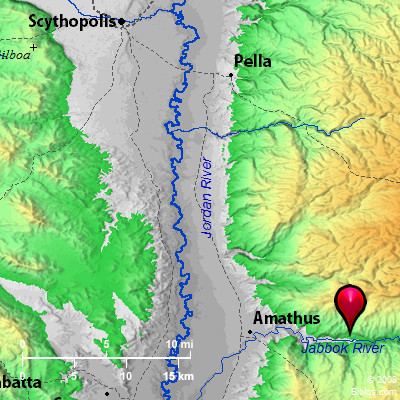Atlas  Jabbok River and surrounding area Maps Created using Biblemapper 3.0 Additional data from OpenBible.info You are free to use up to 50 Biblos coprighted maps (small or large) for your website or presentation. Please credit Biblos.com. Occurrences Genesis 32:22 He rose up that night, and took his two wives, and his two handmaids, and his eleven sons, and passed over the ford of the Jabbok.Numbers 21:24 Israel struck him with the edge of the sword, and possessed his land from the Arnon to the Jabbok, even to the children of Ammon; for the border of the children of Ammon was strong. Deuteronomy 2:37 only to the land of the children of Ammon you didn't come near; all the side of the river Jabbok, and the cities of the hill country, and wherever Yahweh our God forbade us. Deuteronomy 3:16 To the Reubenites and to the Gadites I gave from Gilead even to the valley of the Arnon, the middle of the valley, and the border of it, even to the river Jabbok, which is the border of the children of Ammon; Joshua 12:2 Sihon king of the Amorites, who lived in Heshbon, and ruled from Aroer, which is on the edge of the valley of the Arnon, and the middle of the valley, and half Gilead, even to the river Jabbok, the border of the children of Ammon; Judges 11:13 The king of the children of Ammon answered to the messengers of Jephthah, "Because Israel took away my land, when he came up out of Egypt, from the Arnon even to the Jabbok, and to the Jordan: now therefore restore those lands again peaceably." Judges 11:22 They possessed all the border of the Amorites, from the Arnon even to the Jabbok, and from the wilderness even to the Jordan. Encyclopedia JABBOKjab'-ok (yabboq, "luxuriant river"): A stream in Eastern Palestine first named in the history of Jacob, as crossed by the patriarch on his return from Paddan-aram, after leaving Mahanaim (Genesis 32:22). On the bank of this river he had his strange conflict with an unknown antagonist. The Jabbok was the northern boundary of the territory of Sihon the Amorite (Numbers 21:24). It is also named as the border of Ammon (Deuteronomy 3:16). It is now called Nahr ez-Zerqa, "river of blue," referring to the clear blue color of its water. It rises near to `Amman-Rabbath Ammon-and makes a wide circuit, flowing first to the East, then to the Northwest, until it is joined by the stream from Wady Jerash, at which point it turns westward, and flows, with many windings, to the Jordan, the confluence being just North of ed-Damiyeh. It drains a wider area than any other stream East of the Jordan, except the Yarmuk. The bed of the river is in a deep gorge with steep, and in many places precipitous, banks. It is a great cleft, cutting the land of Gilead in two. It is lined along its course by a luxuriant growth of oleander which, in season, lights up the valley with brilliant color. The length of the stream, taking no account of its innumerable windings, is about 60 miles. The mouth of the river has changed its position from time to time. In the lower reaches the vegetation is tropical. The river is fordable at many points, save when in full flood. The particular ford referred to in Genesis 32 cannot now be identified. JABBOK, river, rises 25 ms. n.e. of the Dead Sea, flows easterly at first around in a great circle to the w. It is about 75 to 80 ms. long, now called the Zerka, or blue, is perennial near the Jordan. Its mouth is 40 ms. n.e. from Jerusalem. Strong's Hebrew H2999: Yabboqa river East of the Jordan |



